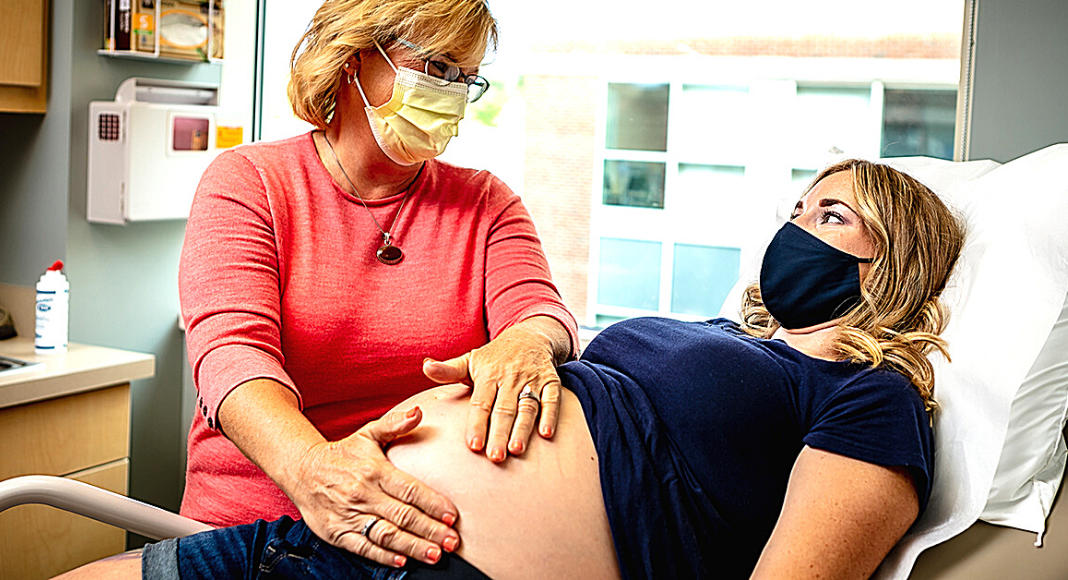
Do you ever think about the days before we had hospitals and doctors like we do today? Have you ever thought about what it was like for women giving birth back then without the advances in medicine and technology we have in the 21st century? Now, we have options if we want to give birth with just an OB/GYN or if we want to have a midwife and give birth naturally in home-like settings at Miami Valley Hospital South in Centerville. We have so many options, but you may be asking, “What’s the difference between a doctor and a midwife?” Premier Physician Network certified nurse midwife (CNM), Carla King, teamed up with Premier Physician Network’s Dr. Leesa Kaufman to answer this question in detail for our readers.
Do OB/GYNs and Midwives Have the Same Amount of Education?
The first question that might come to mind is what types of education doctors and midwives have. Premier Physician Network’s Carla King, CNM answered with this: “No – they pursue two different paths of education. Midwives must first complete their Bachelor degree, typically in Nursing. Then, they go on to complete a Masters degree in Nursing (MSN), focusing on midwifery. Midwives must sit for a nationally certified board exam after they complete their MSN.”
Premier Physician Network’s Dr. Leesa Kaufman added, “OB/GYNs also complete a Bachelor degree, typically in a science-related field. They then go on to a 4-year medical school where they will complete training in all areas of medicine. After medical school, physicians choose a specialty and then spend another 3-7 years in a residency program for advanced training specifically focused on that specialty. OB/GYNs also complete a nationally certified board exam in their specialty.”
What Can a Midwife Offer that is Not Found with an OB/GYN Alone?
According to Premier Physician Network’s Carla King, CNM, “Midwives support physiologic birth, meaning birth that typically requires less intervention for healthy women with low risk pregnancy. To promote this, midwives provide more one-on-one labor support including coaching and encouragement through labor, recommending movement and position changes that aid in optimal baby positioning for birth, and alternative therapies like therapeutic touch and hydrotherapy during labor and birth.”
What Unique Services Does an OB/GYN Offer?
Premier Physician Network’s Dr. Leesa Kaufman shares, “OB/GYNs can take care of a woman’s needs throughout her entire reproductive career, starting with adolescent needs, then family planning, contraception, and pregnancy (both low- and high-risk). OB/GYNs can also care for abnormal menstrual cycles, pelvic pathology including, but not limited to, endometriosis, polycystic ovarian syndrome, fibroid tumors, ovarian pathology, cervical cancer screening and treatment, and infertility. OB/GYNs support menopause transition. These doctors are trained in surgical intervention, including hysteroscopy, laparoscopy, hysterectomy, myomectomy, endometrial ablation, tubal ligation, and operative deliveries as well as natural births.”

What to Expect with a Midwife {Answered by Carla King, CNM}
- General Expectations
- Midwives provide education during pregnancy to help women make informed choices for their birth experiences. They provide support and family centered care, helping women feel confident and empowered during labor and the birth process.
- Pain Medication Options
- Women may choose natural pain relief options like massage, movement, focused breathing, and hydrotherapy, as well as pain relieving IV medications or an epidural when they choose midwifery care.
- What if Complications Arise?
- Midwives’ collaborating physician(s) are available to provide medical intervention and other assistance if labor becomes too complicated or outside the midwives’ scope.
What to Expect with an OB/GYN {Answered by Dr. Leesa Kaufman}
- General Expectations
- Comprehensive care that involves sound evidence-based medical judgment, low intervention when appropriate, coordinated care between patient family and provider.
- Pain Medication Options
- Natural labor with hydrotherapy, IV pain medication, epidural medication.
- What if Complications Arise?
- Board-certified and board eligible OB/GYN’s are trained to handle complications of labor and delivery.













